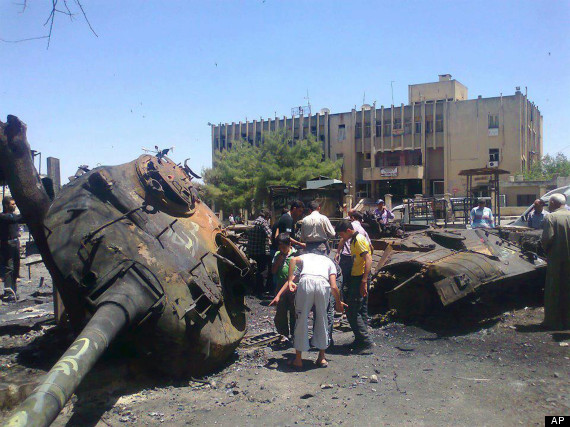By: Alexander Corbeil
The Syrian crisis has entered into its eleventh and bloodiest month, with roughly 8,000 dead and no end in sight. The Free Syrian Army (FSA), though under heavy barrage in Homs, continues to provide stiff resistance against President Bashir al-Assad. Damascus’s security forces and elements of the military have proven their loyalty with increasingly violent acts against civilians and rebels. Defections, although much publicized, have not occurred among higher ranking officers or from special units such as those hailing from tank divisions, heavy weapons, or artillery brigades. This is coupled with the fact that these defections have occurred as a trickle, rather than a flood of whole regiments or battalions.
All signs point to a protracted conflict, in which neither side gains an advantageous position vís-a-vís the other. This hurting stalemate is sure to bleed both sides of valuable resources and lives. Several factors have coalesced to ensure that the Syrian uprising will not take place in a fast paced manner. This article will shed light on the military dimensions of the current uprising and the intricate factors that have amalgamated to ensure a lengthy and indecisive conflict.
The Free Syrian Army
The FSA has been touted by Western media as a large, cohesive fighting force owing its numbers to defections from the military. This imaginary narrative is extremely dangerous for those attempting to analyze the situation and for policy makers both within the Arab World and the West. In reality the FSA is a brand, a recognizable and patriotic labeling that is utilized by a variety of armed groups. While the defection of soldiers has bolstered the organization’s strategic capacity, its operations are also undertaken by a large and prevalent civilian contingent. This amateurish factor, in addition to the inability of the FSA to undertake coordinated provincial or national attacks, undercuts its capacity to threaten the existence of the Assad regime.
These operational constraints are compacted by the demographical composition of the ranks of the loosely affiliated FSA groups. The FSA is largely a poor and rural Sunni endeavor, thus it does not enjoy the support of the entirety of Syrian society, especially among the one-third of the populace that belongs to minority identity groups. Given fears of sectarian violence and the proliferation of arms across the region the international community is extremely hesitant to arm the rebels. The FSA’s meager operational capacity and its lack of cross-sectarian and international support ensures that while it will continue to pester Assad’s forces it cannot make any meaningful gains against the Syrian regime.
The Syrian Army and Security Forces
One would posit, that given the relative weakness and disorganization of the FSA, that the Syrian regime could easily route rebel forces. Paradoxically, the Syrian army, strong numerically and highly trained in comparison to the FSA, has largely not taken an active role in suppressing the current uprising. This is due to the fact that under Bashir’s father the army was largely stripped of its internal security duties given a culture of military coups in the region, while the officer corps were filled with Alawites and relatives of the al-Assad family. High ranking officers were given economic opportunities in the civilian sector in order to placate their diminished role as the security services, loyal to the president and composed of fellow Alawites, were created to ensure domestic submission. While the security services were proficient in keeping track of dissident groups, and putting down localized revolts, the current Syrian uprising is at such an endemic level that they are unable suppress it.
Now the duty to suppress the revolt has shifted again to the military, which presents its own issues. Bashir is heavily relying on his brother Maher who commands the army’s elite Republican Guard and Fourth Division, the latter of which proved its ruthlessness in the siege of Deraa last year. The reason for this reliance is the fact that the lower ranks of the army are composed of poor rural Sunni soldiers who hail from the areas that are heavily stepped in revolt. These soldiers are not tied to the regime through the same economic and sectarian paradigms as the upper brass. Assad learned early during the uprising that dispatching these soldiers resulted in mass defections. As a result, the military has largely been assigned to the barracks under the watchful eye of the security services and thus unable to provide a decisive blow to the FSA. Given the relative weakness and limited operational capacity of the FSA in congruence with the army’s unwillingness to repress the revolt, the Syrian uprising will for all intensive purposes remain a hurting stalemate.
Further Reading:
Hurting Stalemate in Syria ; Nir Rosen on Syria’s Armed Opposition ; How to set Syria Free ; Assad’s Inner Circle ; From Political to Economic Actors: The Changing Role of Middle Eastern Armies
Disclaimer: Any views or opinions expressed in this article are solely those of the authors and the news agencies and do not necessarily represent those of the NATO Council of Canada. This article is published for information purposes only.




